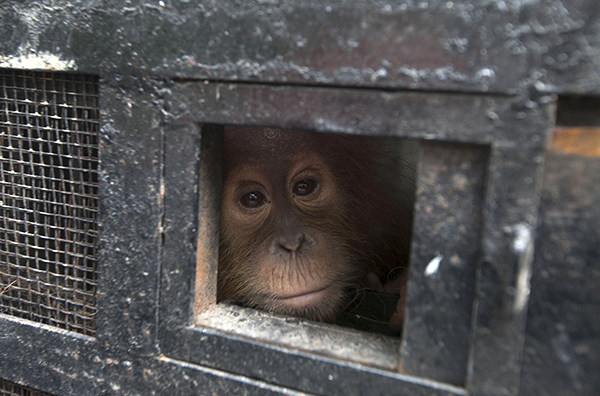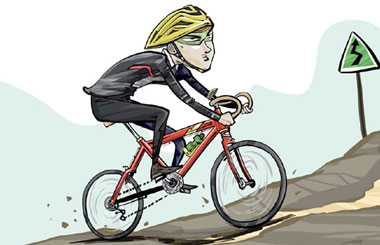EU launches plan to crack down on wildlife trafficking
Updated: 2016-02-27 10:26
By Chen Yingqun(chinadaily.com.cn)
|
|||||||||
 |
|
A baby Sumatran orangutan looks out from a cage as it was recovered by police after they arrested wildlife traffickers in Aceh province, Indonesia , November 16, 2015 |
The plan will mobilize all EU diplomatic, trade and development cooperation tools to crack down on what has become one of the most profitable criminal activities worldwide.
It says that recent years have seen a dramatic surge in wildlife trafficking. An estimated 8 billion to 20 billion euros pass annually through the hands of organized criminal groups, ranking alongside the trafficking of drugs, people and arms.
It not only threatens the survival of some emblematic species, it also breeds corruption, claims human victims, and deprives poorer communities of much-needed income. It also threatens security in Central Africa, where militia and terrorist groups partly fund their activities through wildlife trafficking.
"Wildlife trafficking and poaching are drivers of insecurity and instability in several countries and regions. They can provide resources to armed groups and encourage corruption. We have to build strong partnerships with the countries along the trafficking chain – origin, destination and transit. The EU is ready to work with its partners in order to stop this form of trafficking and to support affected communities," says Federica Mogherini, vice-president of the European Commission and High Representative of the Union for Foreign Affairs and Security Policy.
The EU is a destination, source and transit region for trafficking in endangered species, which involves live and dead specimens of wild fauna and flora, or parts of products made from them.
More than 20,000 elephants and 1,200 rhinoceroses were killed in 2014 and, after years of recovery, their populations are once more in decline. As the biggest donor internationally, the EU is supporting conservation efforts in Africa with 700 million euros for the period 2014-2020.
The plan comprises 32 measures to be carried out between now and 2020 by the EU and its 28 member states.
It focuses on three priorities: Prevent trafficking and reduce supply and demand of illegal wildlife products; Enhance implementation of existing rules and combat organized crime more effectively; and Strengthen cooperation between source, destination and transit countries.
The plan will be presented to the EU member states for endorsement in the coming weeks.
Today's Top News
Points of view
Small island makes a big difference
Rubio, Cruz gang up on Trump in debate ploy
'Invented-in-China’ products to the fore at MWC
Beijing edges NYC as home to most billionaires
110,000 refugees, migrants reach EU by sea in 2016
Tech giants reveal 5G innovations in Barcelona
Mechanism to be built to monitor ceasefire in Syria
Hot Topics
Lunar probe , China growth forecasts, Emission rules get tougher, China seen through 'colored lens', International board,
Editor's Picks

|

|

|

|

|

|






